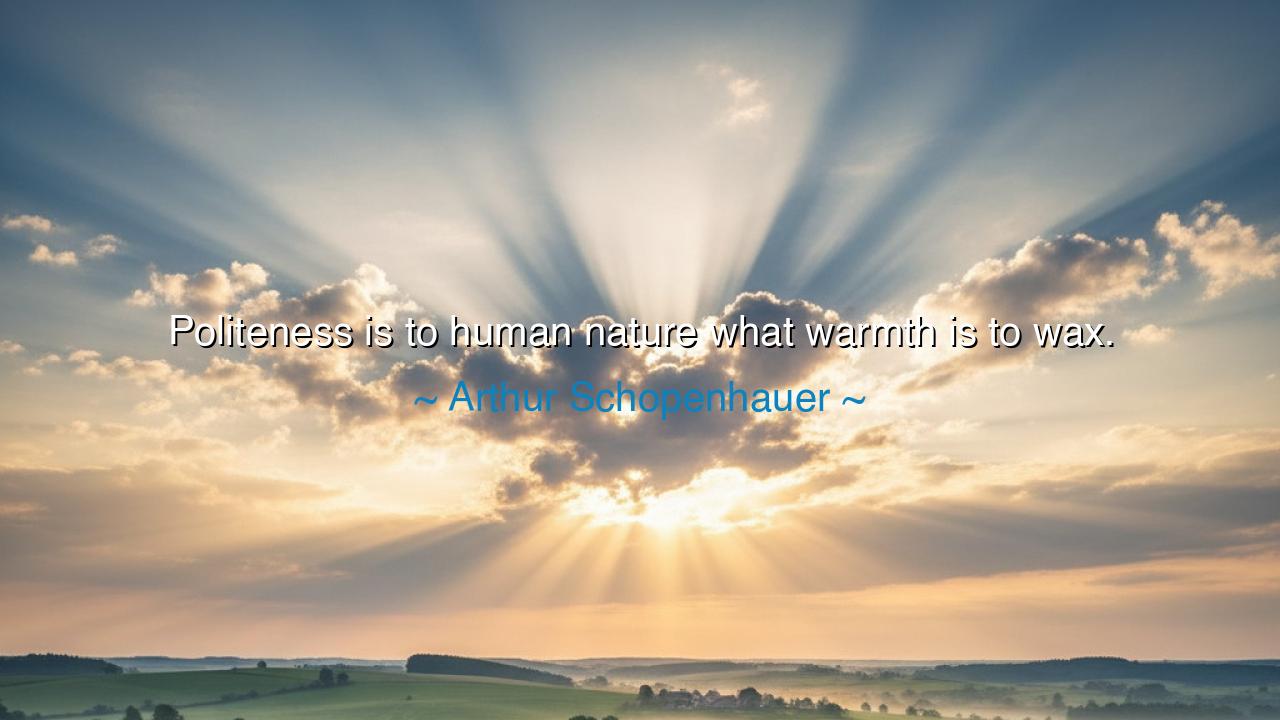
Politeness is to human nature what warmth is to wax.






Hear the words of Arthur Schopenhauer, the philosopher who looked deeply into the restless core of man, and spoke with a voice both stern and profound: “Politeness is to human nature what warmth is to wax.” In this image of quiet brilliance, he teaches us that the hard shell of the human spirit, often cold and rigid, can be softened not by force, nor by argument, but by gentleness, courtesy, and the simple grace of kindness. Just as wax, stiff and unyielding in the cold, becomes pliable and open when touched by warmth, so too does the heart of man melt when treated with dignity and respect.
For human nature is a paradox: proud and self-defensive, yet yearning for connection; quick to harden, yet eager to be softened. To confront another with harshness is to find resistance, but to approach with politeness is to awaken their better self. The roughest man, the fiercest enemy, the most distant stranger—each, when touched with courtesy, feels the ice within them break. In this way, politeness is not mere formality, but a subtle power, a quiet alchemy that transforms opposition into openness.
Consider Abraham Lincoln, whose gentleness of spirit in times of war softened even his enemies. When the Union triumphed, many demanded vengeance upon the South. Yet Lincoln, in his second inaugural address, spoke not with scorn but with warmth, saying, “With malice toward none, with charity for all…” These words, spoken with humility and politeness, melted the hearts of countless foes and offered a path toward reconciliation. His courtesy was not weakness; it was the warmth that softened wax, shaping a broken nation toward unity.
History shows us again and again that politeness wields a power greater than the sword. Mahatma Gandhi, confronting an empire, did not answer hatred with hatred. Instead, with dignity, calmness, and respect even for his oppressors, he stirred the conscience of the world. His manner disarmed those who expected rage, his courtesy revealed the brutality of injustice by contrast, and his warmth became the fire that reshaped the wax of nations. What army could resist such a force, subtle yet irresistible?
Yet let us not mistake politeness for flattery or pretense. Schopenhauer, stern as he was, despised false masks. True courtesy is not deceit, but recognition—that within every person is a soul deserving of respect. To be polite is to honor this truth, even when one disagrees, even when one stands opposed. For the moment courtesy departs, pride hardens, and like cold wax, nothing can be shaped, nothing can be formed.
The lesson is clear: if you wish to shape the world, to guide hearts, to open doors, let politeness be your tool. Speak with respect, not because the other is always worthy, but because you are. Approach with courtesy, not because it always succeeds, but because it preserves your dignity and increases your power to influence. Just as warmth transforms hard wax into something moldable, so does kindness transform hardened hearts into something capable of growth and change.
Therefore, O children of wisdom, take this teaching to heart: be steadfast in truth, but wrap your truth in gentleness. Confront injustice, but do so with dignity. In your homes, your work, your dealings with strangers, let your words be courteous, your tone warm, your actions respectful. For in politeness lies a power greater than command: the power to melt resistance, to soften the spirit, and to shape, as with living wax, the very heart of mankind. Politeness is not weakness; it is the warmth that makes all things possible.






AAdministratorAdministrator
Welcome, honored guests. Please leave a comment, we will respond soon